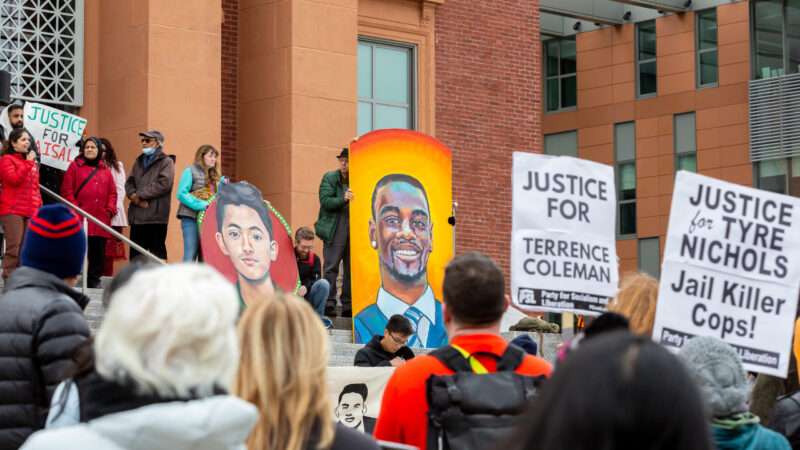
A late acquaintance offered the following scenario to determine a person's fundamental attitudes. Let's say we happen upon police officers beating a suspect. We know nothing about the incident beyond what we're witnessing. Is our gut instinct outrage at the smackdown—or do we figure the cops must be in the right and the suspect no doubt is getting what he deserves?
As someone who generally distrusts government authority and has covered several troubling police-use-of-force incidents, you can probably guess where I'd come down. But I know people who have been victims of violent crime and seem more likely to side with the police. Typically, people tend to make snap judgments about these encounters based on their biases rather than the facts.
Until relatively recently, however, police authorities completely controlled the dissemination of those "facts" and the investigatory process. For instance, California law gives accused officers so many procedural protections that it's nearly impossible to have real accountability. The internal "thin blue line" culture leads the public to distrust official information. Fortunately, video cameras have shifted that dynamic.
Oddly enough, video of some brutal incident—such as the police shooting of an unarmed man begging for his life in Arizona or that Minneapolis officer who kneeled on George Floyd's neck—doesn't always change the viewers' attitudes. Kneejerk police defenders will still make excuses for the cops or change the subject by criticizing the resulting protests or riots.
For their part, many community activists will harangue the police even when a suspect is acting in a violent manner. It seems nearly impossible to bridge the gap between "back the badge" conservatives who fly those blue-stripe flag desecrations and "defund the police" progressives who fail to acknowledge the human toll of the latest violent-crime wave.
Perhaps the latest horrific incident in Memphis might push the nation back to the center: toward an understanding that we can actually do two things at once by fighting violent crime and firing badge-wearing thugs. A few years ago, the stars were aligning for a sensible bipartisan police-reform movement, but recent culture wars swept away that opportunity.
It was painful to watch the video of four Memphis police officers pummeling Tyre Nichols after a traffic stop near his home last month. "The initial police report said Nichols 'started to fight' with officers and at one point grabbed one of their guns," CNN reported. "But neither claim was substantiated by police videos released last week."
Someone leaked that report to a radio host despite the police department's consternation. To its credit, the department released some of the gruesome video footage. As Nichols was on the ground, an officer kicked him, another hammered him with a baton and another pepper-sprayed him. It reportedly took 22 minutes for an ambulance to arrive. Fortunately, the city fired the officers and the DA is pressing charges.
This case will make it harder for culture warriors of the left and right to focus on tangents. The video is lengthy, so police defenders can't claim it was taken out of context. Nichols is black, but so were his attackers—thus diminishing the racism angle. So far, ensuing protests have been perfectly peaceful, thus allowing the public to focus on the incident rather than the aftermath.
As I've often argued, the problem centers on the nature of our current policing bureaucracy and its stubborn refusal to embrace even modest reforms. Current police culture promotes militarization—the idea that officers are engaged in a war for our streets rather than involved in a civilian operation that requires community support and trust. That's why I oppose efforts by the military to send decommissioned hardware to local police forces.
Politicians on both sides of the aisle actively court the support of police organizations, so they pass crime bills and other measures that always ramp up funding. Even in progressive California, union-friendly Democrats have granted police unions a special bill of rights and secrecy protections that make it nearly impossible to fire abusive officers.
Federal laws give officers wide-ranging immunity. The federal drug war led to asset-forfeiture laws that let police agencies take our property without due process or proof that its owner committed a crime. If you pass police-state laws, you get police-state behavior. Yet instead of evaluating these measures individually, Americans easily fall into the "pro-cop" or "anti-cop" trap.
And even when lawmakers pass a long-awaited reform, the bureaucracy digs in and resists its implementation. California Attorney General Rob Bonta has publicly supported police-oversight measures. However, CALmatters reports that the Justice Department "hasn't probed—or even logged—all police shootings of possibly unarmed people," as required by a 2020 law.
Reason's J.D. Tuccille is correct that the Nichols killing should revive widespread efforts at police reform—but that will only happen once Americans stop instinctively choosing sides and start looking deeply at the way our "public safety" agencies operate.
This column was first published in The Orange County Register.
The post After Tyre Nichols Killing, It's Once Again Time To Build a Bipartisan Movement for Police Reform appeared first on Reason.com.







